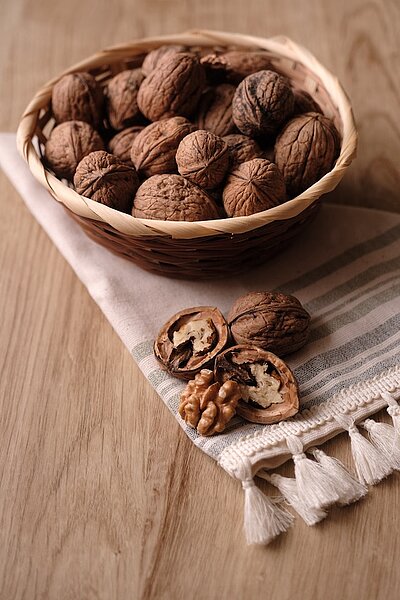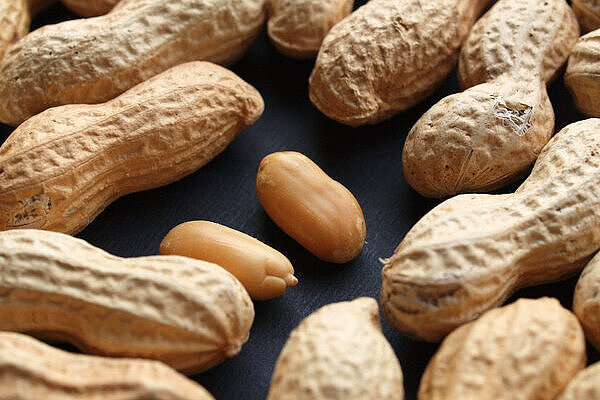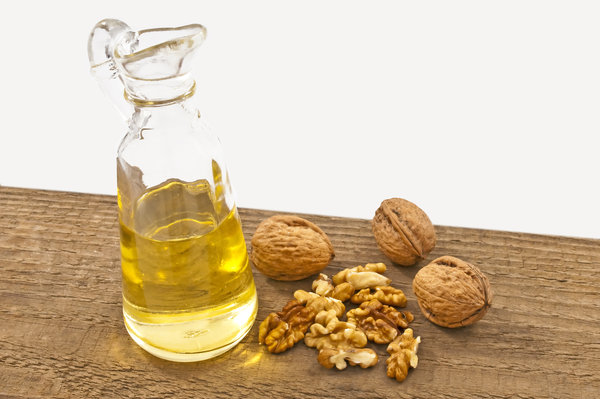Walnut

You may have heard that walnuts can be poisonous to dogs. But is that really true? And what are walnuts anyway? In this article, you'll find out everything you need to know about this ingredient.
What are walnuts?
Walnuts are the fruit of the walnut tree, which belongs to the beech family. They grow in a green shell that opens in the fall to reveal the nut. The nut has a hard, brown shell and a soft, light-colored kernel. Walnuts are rich in unsaturated fatty acids, protein, vitamins and minerals. They taste sweet and nutty and are often used for baking or snacking.
Are walnuts healthy for dogs?
Walnuts have many health benefits for dogs if they are fed in moderation. For example, they can strengthen the immune system, nourish the skin and coat, promote brain function and reduce inflammation. They can also help to lower cholesterol levels and prevent cardiovascular disease.
Are walnuts dangerous for dogs?
However, walnuts can also have some disadvantages for dogs if they are fed too often or in too large quantities. For one thing, they contain a lot of fat and calories, which can lead to obesity and digestive problems. Secondly, they can contain molds that are very toxic to dogs. These fungi produce aflatoxins, which can cause liver and kidney damage. Walnuts can also trigger allergies or intolerances, which can manifest themselves in skin rashes, itching or diarrhea.
How do you feed walnuts to dogs?
If you want to give your dog a walnut from time to time, there are a few things you should bear in mind. Firstly, you should only use fresh and unsalted walnuts that show no signs of mold or decay. Secondly, you should crack the walnut out of the shell and cut it into small pieces to make it easier for your dog to chew and swallow. Thirdly, you should adjust the amount of walnuts to your dog's size and weight. A rule of thumb is that a dog should not eat more than half a walnut a day. Fourthly, you should always pay attention to how your dog reacts to the walnuts.
Walnuts are a tasty and nutritious ingredient for dogs that can have positive effects on their health in small quantities. However, you should also be aware of the possible risks and not overfeed your dog with walnuts.
Properties 5
Are you looking for other ingredients with a specific property?
Just click on them to find more.
If you notice any signs of hypersensitivity or poisoning in your dog, you should see your vet immediately. We are not a substitute for a vet, but we try to be as accurate as possible. Every dog reacts differently and we recommend you get a second opinion or consult your vet if in doubt.
Stay healthy and take good care of your four-legged friend!😊
Similar to Walnut
The peanut is a plant from the legume family and originally comes from South America. The fruits of the peanut are seeds that grow in a hard shell. This shell is often referred to as a nut, although...
Hazelnuts are the seeds of the hazelnut, a plant from the birch family. The hazelnut grows as a shrub or small tree and bears round or oval nuts with a hard shell and a sweet kernel in the fall....
Walnut oil is pressed from the kernels of walnuts. There are different methods of oil extraction, which affect the quality and taste of the oil. Cold-pressed walnut oil is of the highest quality, as...
Walnut leaves are the leaves of the walnut tree, which belongs to the beech family. The walnut tree is primarily known for its tasty nuts, which contain many healthy fats, proteins, vitamins and...



